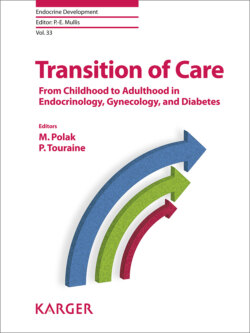Читать книгу Transition of Care - Группа авторов - Страница 18
На сайте Литреса книга снята с продажи.
The Right Moment of the Transfer?
ОглавлениеWe believe that age, often an administrative criterion, is not the best and only factor to decide upon transition of care [19]. The right moment is dependent upon the maturity of the young person. Usually it will be when growth and puberty are achieved, and also when a school cycle terminates, e.g. at the end of secondary school. Often this is around 18 or 19 years of age, as was found in a survey of young patients affected by endocrine conditions and also in the case of growth hormone-deficient children [19, 20] (Table 1).
Table 1. Factors either facilitating or limiting the chances of a successful transition
| Facilitating factors | Limiting factors |
| Linked with the transition process | |
| Meeting with the team of adult medicine, before and during the process of transitionEarly information/discussion about the path to transition before transfer (names of the members of the adult medicine team, practical information on the modalities of the transfer…) during outpatient clinics and with written documents (flyers…)Identification of the specialist for adults the adolescent is referred toLogistic help to organize transfer and then follow-up in the adult medicine department (transition coordinator, dedicated number to take appointments)The young person should play an active role in the processTherapeutic education sessions (exchanges of experience with peers) | Absence of preparation or late (just before transfer) preparation in the pediatric departmentNo identification of a referring physician in the department for adult medicineDifficulties to take appointments and to contact the department for adult medicineToo early transfer |
| Linked with the pediatric department and the department for adults | |
| Formalization of the transition path between the two departmentsSpaces dedicated to the transition phase:“La suite” at Necker University Hospital1 Transcend project at Pitié-Salpêtrière University Hospital2 | Lack of communication between the two departmentsImportant differences in the treatment protocols between the pediatrician and the physician for adult persons |
| Linked with patient history | |
| Psychosocial challenges and daily life constraints (working hours, family…) in competition with the good care of the chronic conditionDifficulties with health insuranceNonoptimal follow-up in pediatricsPoor socioeconomic background | |
| Adapted from Garvey et al. [24]. 1 https://www.youtube.com/watch?v=RR7uLSo3r4M. 2 http://pitiesalpetriere.aphp.fr/transend/. |
Transition should not be associated with a feeling of punishment by the young person with a chronic condition, but in contrast be felt as a step towards autonomy and adult life. This is why therapeutic education should also be part of the transition plan. Programs have been designed, independently of the underlying endocrine conditions, to target common themes in relation to transition [21]. One program currently used in the department of endocrinology for adults at the Pitié-Salpêtrière Hospital is based on a triple approach: the first is based on the description of the medical history using paper boards with multiple images reinforcing the ability of the young adult in describing his own story; the second approach helps the patient to find his own landmarks in the new hospital or the new department of medicine; finally a singular and particular approach has been developed to build a program for the near future and to conciliate both desires and wishes on the one hand and the consequences of the chronic disease on the other. One limiting factor concerning such a project is the current absence of a complete long-term evaluation of its impact on health status.
Fig. 1. Schematic representation of the constellation of factors influencing the success of transition.
